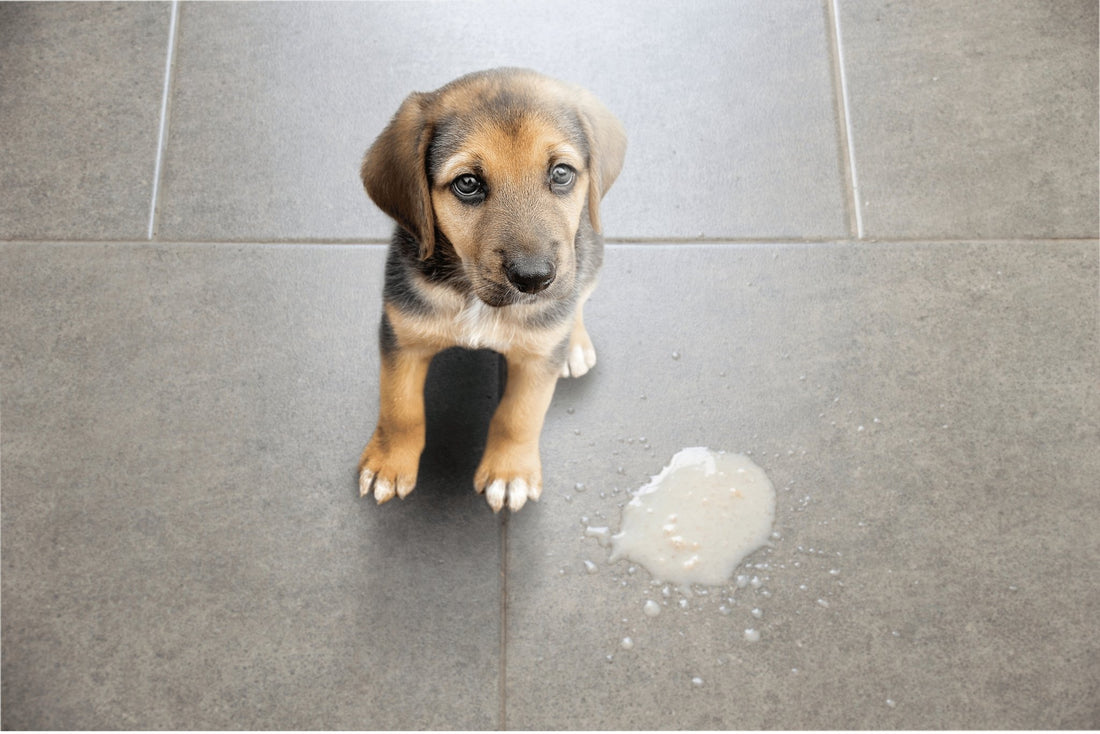
What To Do When Your Pet Has An Upset Tummy
Share
It’s not uncommon for pets, especially dogs to get upset tummies. During the holidays, it’s particularly common, mostly in dogs who are fans of dumpster diving. Oh boy! Most dog owners have heard that old familiar sound of their dog retching followed by a splatter in the middle of the night.
Believe it or not; upset stomachs aren’t just caused by a forbidden feast. Your pet might have an upset stomach for any number of reasons. Figuring out why your pet is sick will help you determine how to help them.
Let’s talk tummies. We’ll go over what can cause a tender tummy, what to do when your pet has an upset tummy, and how to know when it’s time to give the vet a call. Let’s get to it!
What Causes An Upset Stomach In Pets?
If your dog or cat has a case of diarrhea and your trash can has obviously been plundered, the cause of their tummy troubles is obvious. But sometimes it’s a little harder to figure out why your pet may have an upset stomach.
Some causes of tummy trouble are much more urgent than others. The reasons can range from a little irritation from new food to a blockage that might require surgery. Since some pets, especially cats, are good at hiding when they are in extreme discomfort, it is always advisable to call your veterinarian.
Common causes of an upset stomach include:
- Dietary changes- Sudden food changes can be a shock to the system of some animals. Slowly mixing their new food in with their old food over the course of several days to a week can help prevent loose stools and upset tummies in sensitive dogs and cats. This can also help you detect a sensitivity to the new food without making the problem worse.
- Parasites- Parasites may cause vomiting, diarrhea, bloody stools, weight loss, or a distended stomach. Worms can show up in your pet’s stool as small white flecks. If you have recently had a flea issue or you have seen your dog or cat drinking from a puddle, parasites are a strong possibility.
- Blockage- This can be caused by your pet eating something hard to digest like a bone or a sock. In cats, a large hairball can be responsible for a blockage. A blockage can also be caused by a section of the intestine collapsing on itself. Blockages can be life threatening, contact your vet if you think a blockage is possible.
- Pancreatitis- This is swelling of the pancreas caused by too much fatty food and some breeds of dogs are predisposed. This condition is common during the holiday season. Your dog will most likely require an overnight stay at the veterinarian. There are natural ways to reduce the severity or risk of symptoms including digestive enzymes with meals.
- Bloat- Bloat is a condition caused by the twisting of the digestive tract. The twist leads to obstruction of blood flow. This condition is most prevalent in very large dogs. It requires immediate medical attention.
- Food sensitivity- You might start noticing a pattern when your dog or cat experiences an upset stomach. If they have a sensitivity to their food, you may notice constant diarrhea, vomiting, or weight loss. Sensitivities are most often to a protein, so if you try changing food, try a food with a new protein.
- Toxic substance- Call the vet immediately if you know there’s a chance your pet was exposed to something toxic.
- Parvovirus- This is common in un vaccinated dogs and puppies too young to be fully vaccinated. It requires a veterinary stay so IV fluids can be administered. For more on this topic, follow this link.
- Heat Stroke
- Bacterial or viral infections
- Cancer
- Hairballs- This is reserved for the kitties out there!
- UTI- UTI causing upset stomachs is more common in cats.
Your pet may have an upset stomach without vomiting or diarrhea. If your pet is showing any of these symptoms, he is probably having tummy trouble:
- Drooling
- Gulping
- Licking the air
- Licking the lips (cats)
- Loss of appetite
- Bad breath
- Swollen stomach
- Weight loss
- Gas
How To Treat An Upset Tummy
If your vet thinks that home treatment will be fine for your dog, there are numerous easy home remedies you can try.
- Withhold food for 24 hours. Don't feel bad about not feeding your pet for a short while, they will not starve! Your pet’s digestive tract may need a little break. If they have an upset stomach, they may not be interested in food anyway. Make sure that during this time, your pet is getting water and staying hydrated. Don’t let them drink too much at once, or it may cause greater discomfort. Ice cubes are a good way to provide hydration if your dog or cat has a tender tummy.
- Try a bland diet. Slowly ease your pet back onto solid food. A smaller portion of rice and a boiled chicken breast will keep your pet’s tummy from further irritation while he recovers. If you have it on hand, a small amount of one of the meat varieties of baby food is also suitably bland and easy on the digestive system.
- Use canned pumpkin. Canned pumpkin is safe for both dogs and cats! Mix a small amount into your pet’s food. Pumpkin is full of fiber that will help with diarrhea or constipation. The moisture will also help keep your pet hydrated. Make sure you use plain, canned pumpkin. Don’t accidentally grab pumpkin pie filling as the sugar and spices will make that upset tummy worse.
- Add a little bone broth. Make sure to read the label. No onions! The higher the protein content means it's actually bone broth and not just a stock. Mix it in with their bland diet, or give it to your pet on its own. If your pet has lost his appetite, adding it to their food can make it more enticing and add vital nutrients they may be missing.
- Try some probiotics. If your pet has had digestive issues, restoring his microbiome is very important. Probiotics will help reestablish healthful bacteria in the gut and help prevent future tummy trouble. There are several good ones on the market but you can also try unflavored active culture yogurt, cottage cheese and goat milk kefir. Your pet may just love these new options!
- Add a small amount of hemp and turmeric oil, like our Calming Relief supplement, to your pet’s food. Hemp oil has Omega3 fatty acids, and turmeric is used for its digestion-aiding properties. A size-appropriate amount added to your pet’s food may help restore digestive balance to your pet.
Weekly addition of things like pumpkin and probiotics to your pet's staple diet can help keep the digestive tract working smoothly and can help relieve symptoms in pets who have chronic stomach problems. Consider this a preventative approach to lessen the chances they have upset.
Although upset stomachs aren’t uncommon, it’s important to always keep your pet’s veterinarian informed. Some digestive problems need to be addressed immediately to prevent emergency situations.
Emailing or calling your vet with details will also help create a record if your pet has chronic problems. This can help establish a cause and a solution so you can get your pet’s digestion back on track.
